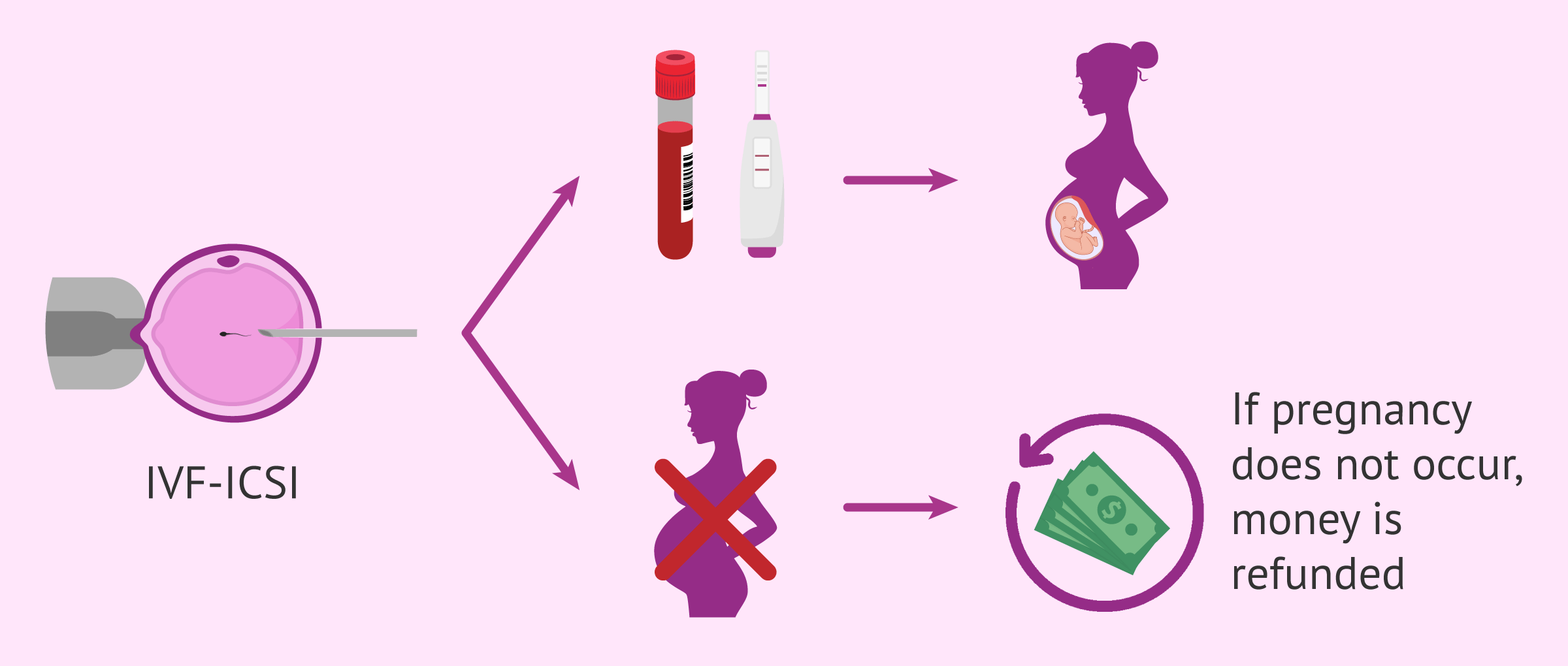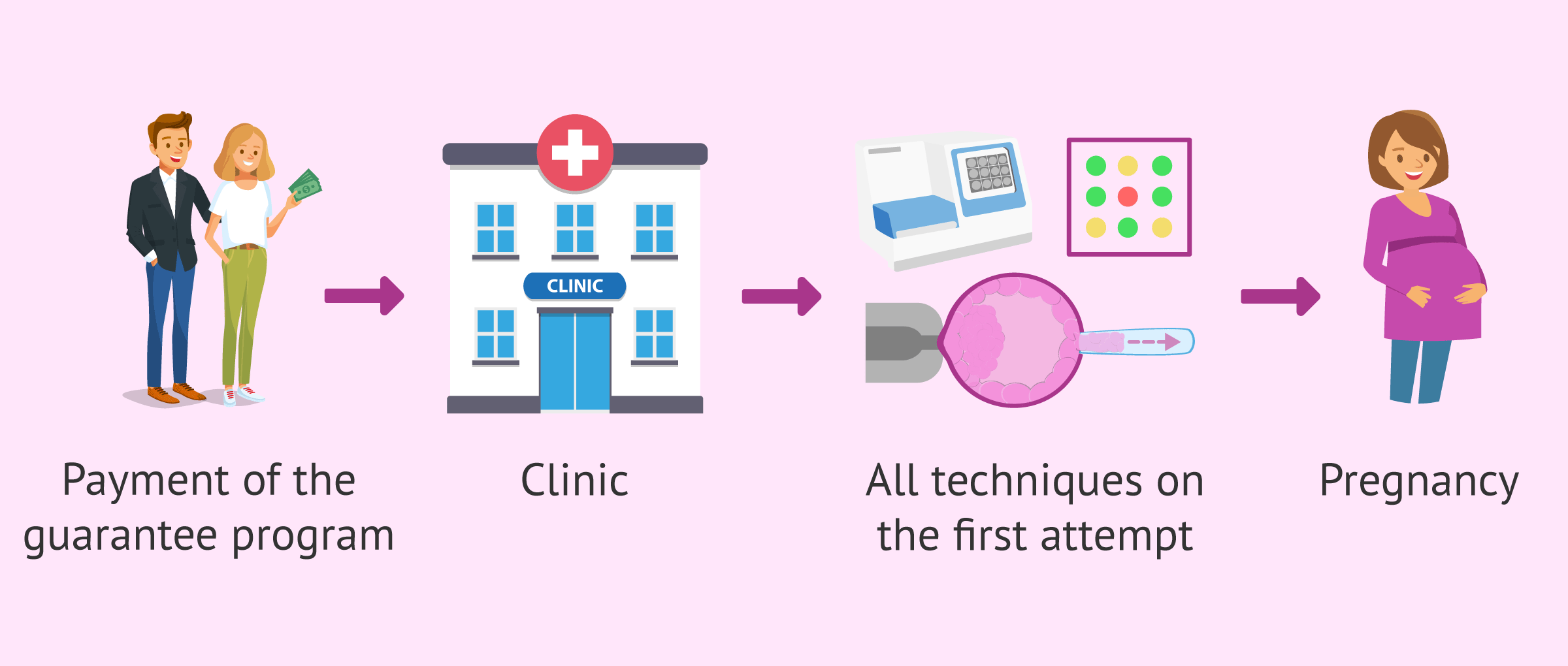In vitro fertilization (IVF) treatments can be frustrating for patients if the desired pregnancy is not achieved, both psychologically and financially. For this reason, some fertility centers offer guarantees and safe pregnancy programs.
The purpose of these programs is to be able to offer, in a comprehensive manner, the possibility of having a healthy baby at home. This objective is to be achieved in the shortest possible time, but with the greatest possible guarantees.
However, each program may be different in relation to the number of treatments performed, whether donor or donor eggs are used, etc. Therefore, it is essential to request all the information prior to selecting a warranty program in order to be well informed about it.
Provided below is an index with the 6 points we are going to expand on in this article.
- 1.
- 2.
- 2.1.
- 2.2.
- 3.
- 3.1.
- 3.2.
- 3.3.
- 3.4.
- 3.5.
- 4.
- 5.
- 6.
What are program guarantees?
Pregnancy guarantees are programs offered by fertility clinics with the goal of achieving a pregnancy. Patients will have to pay an amount of money and will undergo as many IVF cycles as necessary, or are included in the program until they achieve their dream: to have a baby. In case of failure to achieve pregnancy, the amount paid is refunded.
The price of most of these warranty programs is usually fixed, so patients know exactly what it will cost from the start without having to add extra charges.
However, other clinics offer infant programs in lieu of a pregnancy guarantee. This means that you are assured of pregnancy and that the pregnancy will be carried to term, so they offer better results.
What types of programs are there?
Currently, there are two types of guarantee programs. On the one hand, there are assisted reproduction clinics that choose to offer these programs through an insurance company.
In contrast, other fertility clinics have their own warranty programs. This type of guarantee program has the advantage that the clinic provides all the effort, techniques, and resources to achieve the pregnancy the first time. Each of them is discussed below.
Guarantee programs through insurance companies
This type of program is offered by some fertility clinics, but through an insurance company, i.e. an external company. Therefore, the insurer does not perform any of the treatments and is only responsible for managing the payment of the program. Therefore, this type of warranty program is merely a product sold to clinics.
All the procedures, techniques, resources, and effort to try to achieve pregnancy must be done by the clinic, but the clinic will only receive the money for each cycle performed.
Thus, if the patient becomes pregnant on the first attempt, the insurer obtains a large financial benefit. However, the fertility clinic will only get the cost of that cycle, regardless of whether the patient has paid a higher amount of money for the program.
In this way, if the patient achieves pregnancy on the third attempt, the fertility clinic will have charged the treatment fee three times. For this reason, it is perhaps possible to think that the centers will not invest all their resources from the outset, but rather will try and test until they are successful.
Thus, if no gestation is achieved in any cycle for a year, the clinic will not lose money. On the contrary, since you will have been charged for each cycle performed and the insurer will be responsible for paying back the program.
Proprietary warranty programs
Other clinics have guarantee programs where the women themselves assume the risk of not achieving pregnancy. This means that patients will pay the full cost of the program to the clinic itself. In case of failure to achieve pregnancy, the clinic will refund the money.
Therefore, the clinic does not receive money for each cycle performed (as it happens if it is done through an external service to the clinic), but they will only charge if gestation is achieved. This is why the center will put all its efforts and available resources into trying to fulfill the dream of its patients in the first cycle. In addition, all complementary techniques such as PGD, Fertile Chip, Time-Lapse embryo culture, etc. will be carried out from the beginning and at the first attempt in order to be successful.
It should be noted that the assisted reproduction clinics that opt for this type of guarantee program, without the intervention of an insurance company, are because they feel more confident about the success of their treatments and the quality and professionalism of their team. This does not mean that, if the agreement is made through an external company, gestation will not be achieved. Pregnancy may or may not be achieved on the first attempt, as the success rate of IVF depends on several factors.
One of them is the quality of the eggs. In the case of IVF treatments with ovodonation, clinics with their own guarantee programs opt to choose donors of proven fertility to increase the probability of treatment success and, therefore, guarantee pregnancy.
Thus, as mentioned above, if the patient succeeds in getting pregnant on the first attempt, the clinic would be very satisfied.
If you would like to learn more about the success rate of ovodonation, we advise you to visit the following article: Ovodonation success rates: What are the chances of pregnancy?
FAQs from users
How is IVF different from an IVF pregnancy guarantee program?
In both cases, the pregnancy is intended to be achieved through IVF treatment. It is usual to pay cycle by cycle of IVF until pregnancy is achieved.
On the other hand, through the guarantee programs, patients pay a certain amount of money and usually have a number of attempts until they become pregnant within a certain period of time. If this is not the case, the money would be returned in full.
Is the pregnancy guarantee program the same as the live birth program?
No. Normally, pregnancy guarantee programs insure pregnancy up to 12 weeks gestation. If a miscarriage occurs after this time, there would be no more attempts possible within the same program.
However, in live birth programs, the guarantee is greater since it is until after the baby is born. In case there is no birth within two years, the money would be refunded.
Are all pregnancy guarantee programs unlimited attempts?
No. Most of these programs offer as many attempts as possible in a one-year period.
Are there requirements to qualify for a pregnancy guarantee program?
Yes, although each fertility clinic has its own requirements and conditions to qualify for such a program. Most commonly, it is the medical specialists who make the decisions about the number of embryos to be transferred, the origin of the eggs, etc.
In case the medical requirements are not met, there are centers that customize each situation and the conditions of the program so that patients can access these guaranteed programs.
What is mixed IVF?
According to Carolina Arboleya, gynecologist at Ovoclinic Madrid, in a mixed IVF, one or two attempts are made with the patient's own oocytes and, if pregnancy is not achieved, the next step is oocyte donation.
In a mixed IVF program, an in vitro fertilization (IVF) attempt is carried out with the patient's own oocytes, even two, and if, for whatever reason, pregnancy is not achieved with this treatment with the patient's own oocytes, we would proceed to an oocyte donation treatment to achieve pregnancy.
Recommended readings
If you want to learn more about the prices of assisted reproduction treatments, we recommend you to visit the following article: What is the price of assisted reproduction treatments?
If you prefer to continue reading information about the success rate of fertility treatments, don't forget to visit the following article: What is the success rate of assisted reproduction treatments?
We make a great effort to provide you with the highest quality information.
🙏 Please share this article if you liked it. 💜💜 You help us continue!
References
FAQs from users: 'How is IVF different from an IVF pregnancy guarantee program?', 'Is the pregnancy guarantee program the same as the live birth program?', 'Are all pregnancy guarantee programs unlimited attempts?', 'Are there requirements to qualify for a pregnancy guarantee program?' and 'What is mixed IVF?'.
Author
More information about Cristina Algarra Goosman





Hi, my health insurance has this type of program, but I am not clear if this will assure me to have a baby at the end of this.
Hi Amber,
The programs offered by insurances may have different features. Generally, when they offer a guarantee program they insure the pregnancy, some even cover past the first trimester of pregnancy. This does not necessarily assure you of having a baby since the pregnancy must develop without complications and that factor is, in principle, external to the fertility clinics.
I recommend that you talk to your insurance company so that they can inform you of all the characteristics and situations in which the program would act and how it would act.
I hope I have helped you,
Best regards